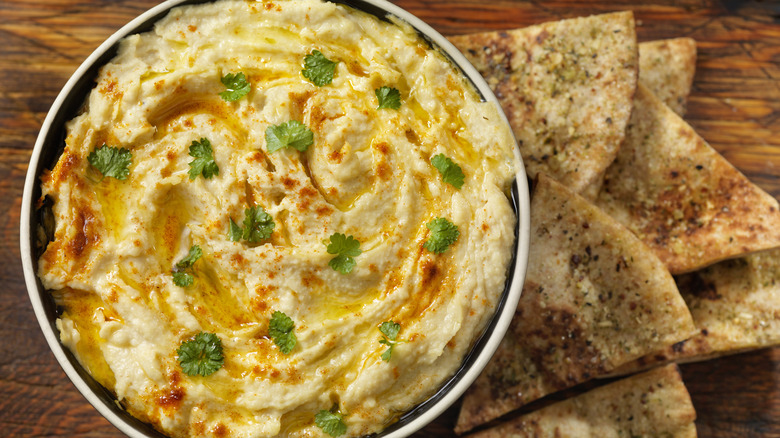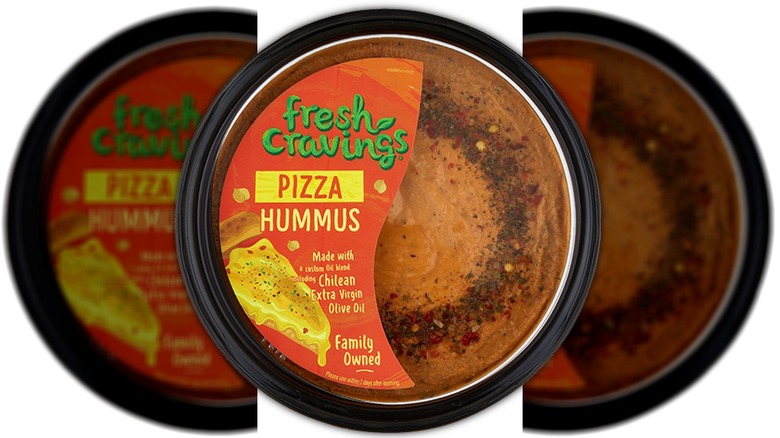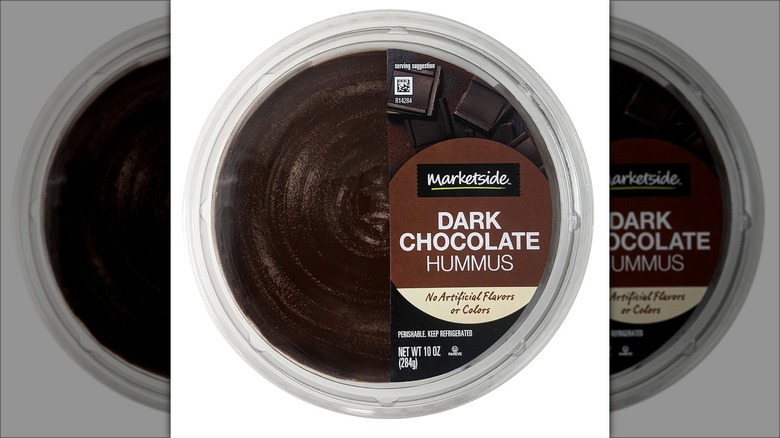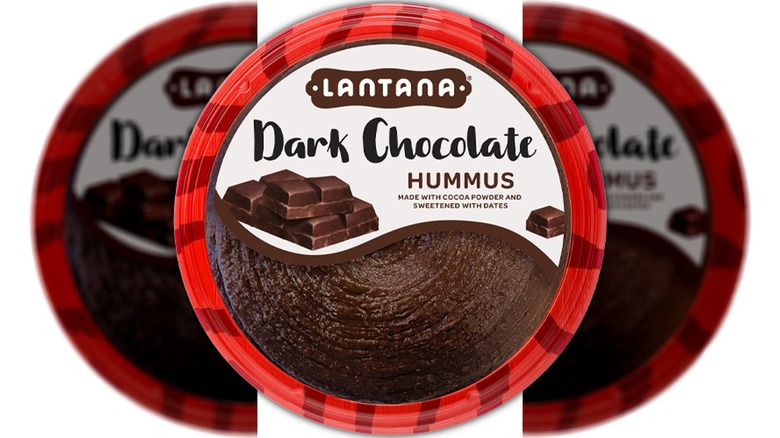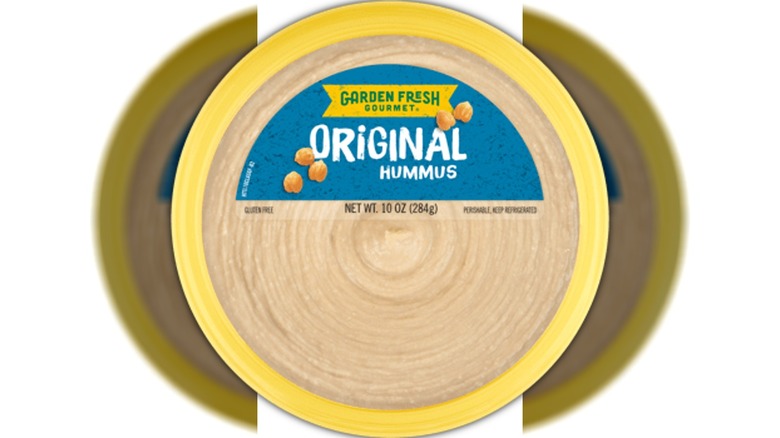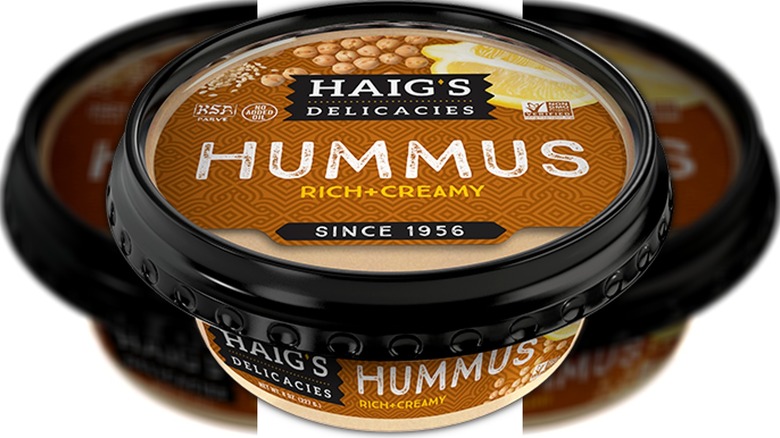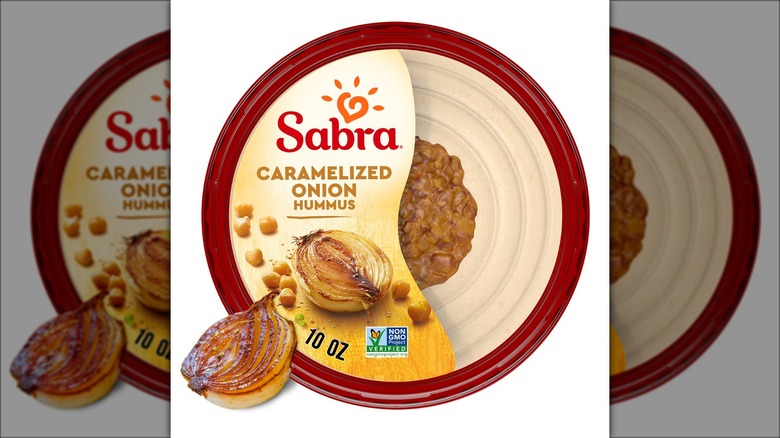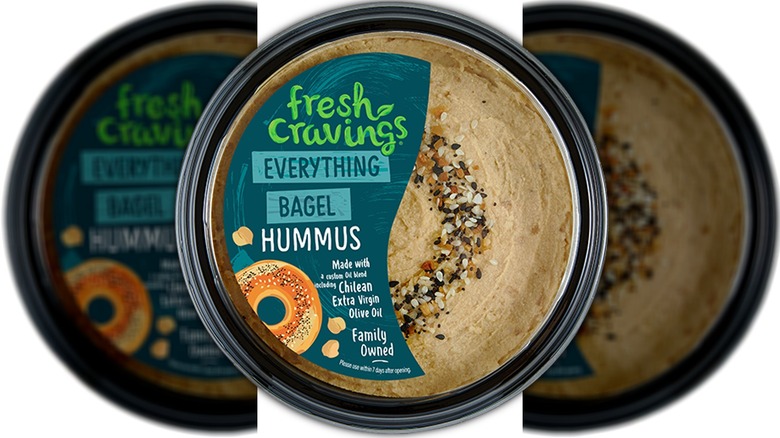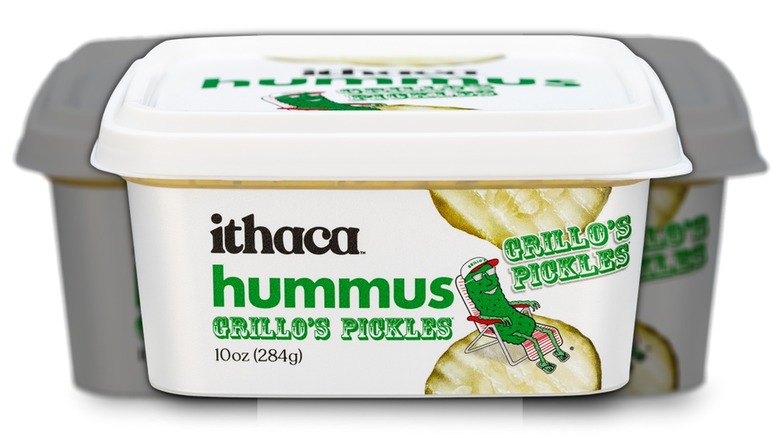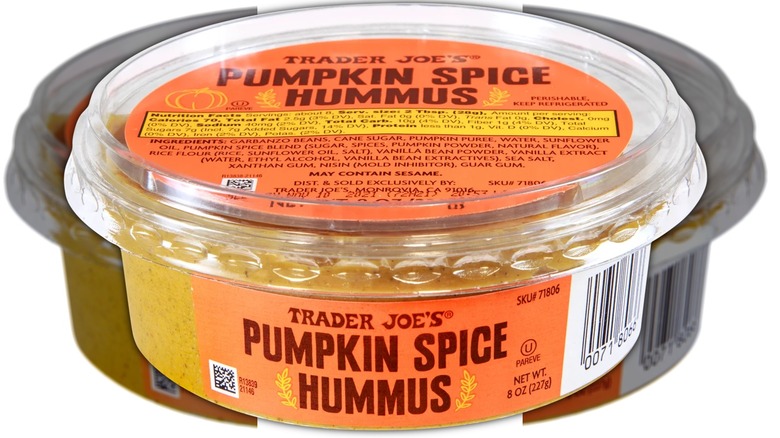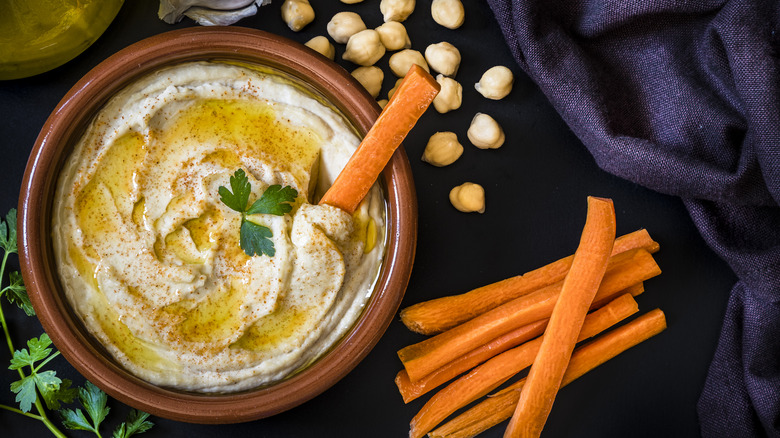9 Unhealthiest Store-Bought Hummus
Made in its simplest form, hummus offers a range of health benefits. This creamy, rich dip heralds from the Middle East, and uses a blend of mashed chickpeas, tahini (which itself is made from ground sesame), lemon juice, garlic, and a dash of olive oil to provide an ample dose of fiber, protein, vitamin B6, and other nutrients.
But that's only if a recipe sticks to the basics. Today, hummus is a grocery store staple — usually hanging around the deli section somewhere — and is whipped up by several brands that don't always keep things that simple. Plenty of store-bought hummus is packed with additional sugars, sodium, and other unnecessary additives that drag down its nutritional profile. What's worse is that some of them will forgo the building blocks that make hummus what it is, such as tahini, despite the fact it has recorded antioxidant and anti-inflammatory benefits.
Sometimes, it's pretty easy to separate the healthy hummus from the not-so-healthy hummus. Anything with high sugar or sodium content should sound alarm bells. As a standard, nutritionists recommend sticking to hummus with 80 milligrams of sodium per serving, or less. Another red flag is anything that markets itself as a dessert hummus (yes, this is a thing). We've done the hard work for you and identified the unhealthiest hummus in stores right now, so you know which ones to skip if you're looking to reap maximum hummus health benefits, and we'll explain more about how we selected each hummus at the end.
Fresh Cravings Pizza Hummus
Let's be real — any product touting itself as a pizza derivative is going to struggle in the nutrition department. By its very nature, pizza is indulgent and shouldn't be eaten every day. Surprisingly, this hummus manages to keep the fat content to a relatively modest 3.5 grams per serving, but it doesn't fare quite as well when it comes to sodium. Whether you slather it on a flatbread or use it as a dip for your favorite veggies, a single serving of Fresh Cravings Pizza Hummus contains 190 milligrams of sodium — more than twice the amount recommended by nutritionists.
Delving deeper into its ingredient list, this hummus also contains both potassium sorbate and sodium benzoate. Both are frequently used as preservatives, but the latter is pretty divisive in the scientific community with some studies linking sodium benzoate to inflammation and oxidative stress that may damage our cells. This is one hummus best left on the shelf if you're trying to make more health-conscious choices.
Marketside Dark Chocolate Hummus
The Marketside Dark Chocolate Hummus is a Walmart exclusive that really stretches the definition of "hummus." While it contains the usual crushed chickpeas, this sweet take on the classic dip — which is somehow still marketed by Walmart as a great pairing for vegetables — substitutes the tahini with dark chocolate. This offers its own range of health benefits, such as reducing inflammation and lowering your blood pressure, and still musters up 1 gram of dietary fiber per serving.
It's low in sodium at 40 milligrams per serving, so we'd be more inclined to look at this hummus favorably if it added some high-quality dark chocolate and left it at that. However, it adds 6 grams of sugar to counterbalance the dark chocolate's natural bitterness, giving each serving a sugar total of 7 grams. That's 12% of your daily recommended intake in just two tablespoons. It also contains no olive oil and instead relies on canola and sunflower oil, both of which can increase inflammation when consumed in large quantities.
Lantana Dark Chocolate Hummus
Just like the Marketside Dark Chocolate Hummus, Lantana Dark Chocolate Hummus ditches the tahini to create a dessert hummus topped with chocolate chips. While we're still on the fence about whether you can still call it a hummus after that, we'll admit that it does a good job of keeping the sodium to a minimum. Each serving of this hummus contains just 15 milligrams of sodium, which is well into the healthy range set by nutritionists.
Lantana Dark Chocolate Hummus is also pretty solid when it comes to dietary fiber, with 2 grams in each two-tablespoon serving. However, things don't look so great in the sugar content, which hits 5 grams per serving — all of which are added sugars — and the same amount of fat, too. Fat is unavoidable in hummus, and isn't necessarily a bad thing; anything made with chickpeas is rich in polyunsaturated fats, which nutritionists consider healthy fats due to their ability to control blood sugar, lower cholesterol, and prevent constipation. However, it's still worth being aware of how much you're consuming — even if it's a healthy fat, too much can increase your risk of conditions such as heart disease or diabetes.
Garden Fresh Gourmet Original Hummus
At first glance, Garden Fresh Gourmet Original Hummus is one of the most traditional on this list. Using both chickpeas and tahini and free of any gimmicky flavors, it provides the exact nutty yet tangy flavor you want from the perfect dip for carrots, chips, or pita bread.
Its biggest issue isn't the taste, but the sodium content. At 140 milligrams per serving, it contains nearly twice the amount nutritionists recommend for hummus. Its ingredient list also lacks the traditional olive oil, swapping it out for canola oil. In most cases, adding in canola oil wouldn't be the worst decision; it's low in saturated fats, unlike a lot of cooking oils, and has been found to potentially have a positive impact on heart health. The issue here is that it shadows in comparison to the benefits offered by olive oil, which contains more antioxidants, tends to be far less processed, and has much more evidence on how it can reduce the risk of heart disease, diabetes, and high blood sugar.
Haig's Delicacies Classic Hummus
Haig's Delicacies are hummus purists, by which we mean it sticks to the basic offerings: classic, spicy, and roasted red pepper. It's the Classic Hummus that generates the most attention thanks to its "glorious abundance" of tahini, which Haig's Delicacies claims make it the "richest, creamiest, and tastiest hummus around."
The problem with going overboard with the tahini and upsetting the tahini-chickpea ratio is that you end up increasing the fat content without significantly improving the nutritional value of the hummus. Haig's Delicacies Classic Hummus contains 5 grams of fat — 1 gram of which is saturated — in every 28-gram serving. That means you'd end up with just under 18 grams of fat in a 100-gram serving, which is significantly higher than the average given by the USDA of 8.93 grams. On the plus side, this hummus doesn't contain sugar, and it has just 65 milligrams of sodium per serving.
Sabra Caramelized Onion Hummus
If you find one hummus on the shelves of your local grocery store, odds are it's Sabra. The brand has established itself as the reigning king of hummus in the U.S., holding a 60% share of the nation's entire hummus market, thanks to its ability to blend traditional Middle Eastern flavors with those the nation already knows and loves (case in point: the existence of Sabra Barbecue Hummus).
Of all its offerings, however, it's the Sabra Caramelized Onion Hummus that sticks out like a sore thumb on the nutrition front. Pairing Sabra Classic Hummus with a generous helping of caramelized onions and smoked paprika, it's an undeniably tasty choice that's sadly high in both sodium (130 milligrams) and fat (6 grams). It also lacks the fiber, calcium, iron, potassium, and vitamin D usually found in hummus. This is thanks in no small part to Sabra's decision to use sunflower oil over the usual olive oil. While the latter contains more micronutrients and is much higher in antioxidants, brands tend to opt for sunflower oil because it costs less.
Fresh Cravings Everything Bagel Hummus
Of all the wild and wacky hummus flavors offered by Fresh Cravings, this one makes the most sense. Fresh Cravings Everything Bagel Hummus is essentially just classic hummus sprinkled with the same toppings you use on a bagel, such as poppy and sesame seeds, garlic, and onion. The combo is sweet and salty and adds a flavorful twist to each dip of a carrot or cracker.
Unfortunately, we can't be quite as generous when praising this product's nutritional value. Fresh Cravings Everything Bagel Hummus contains the most sodium of any hummus on this list. A single serving contains 250 milligrams, which is 11% of the total amount you're supposed to consume in a day. Considering how hard it is to stop at just the two tablespoons, we're also willing to bet that the majority of those dipping into the Everything Bagel Hummus end up consuming a lot more than that — especially if you pair it with something like pretzel chips, bread, or rice cakes. The fiber and fat content aren't too impressive, either, at 1 gram and 5 grams respectively. You may want to consider this more of an occasional indulgence than a daily side for your veggies.
Ithaca Grillo's Pickles Hummus
Ithaca has a refreshingly straightforward approach to hummus. Its founder, Chris Kirby, started the brand from his own kitchen, where he whipped up small batches using only glyphosate-free chickpeas and other fresh, high quality ingredients. Over a decade later, he still prefers to use minimal ingredients to create maximum flavor. When it comes to Ithaca's Grillo's Pickles variety — arguably one of its most unique offerings — that means no preservatives or artificial flavorings, just chickpeas, pickles, water, tahini, vinegar, sunflower oil, salt, garlic, dill, and grape leaves. Simple.
It's not so much the ingredients that let Ithaca Grillo's Pickles Hummus down, but the nutritional info on the back of each tub. While it contains 1 gram of sugar and just 2 grams of fat, a single serving of this hummus is shockingly high in sodium at 230 milligrams in every two tablespoons. For context, that's three times the amount of sodium nutritionists recommend consuming per serving of hummus, and more than you'd find in an entire bag of Lay's Salt & Vinegar Potato Chips.
Trader Joe's Pumpkin Spice Hummus
We love hummus, we love pumpkin spice, and we love Trader Joe's, but we'll be the first to admit that Trader Joe's Pumpkin Spice Hummus sounds like a culinary crime of epic proportions. While the seasonal dessert dip has its fair share of cult fans (and an even bigger share of horrified critics), we'll ignore the taste for a second and focus on its nutritional values — of which there aren't many.
Like most dessert hummus, it scraps the tahini to make way for a sweeter flavor. That gives it 1 gram of fiber, but less than 1 gram of protein. The pumpkin purée and pumpkin spice blend provides the base flavor profile, but — as with most pumpkin spice products — it's cane sugar that does most of the heavy lifting. It's listed second in the ingredients list and totals a whopping 7 grams per two-tablespoon serving. If the idea of combining pumpkin and hummus is appealing to you, you may want to check out our three-ingredient pumpkin hummus recipe to create a fresher version at home instead.
How did we choose the unhealthiest hummus?
Our mission to find the unhealthiest hummus on the market took us to the nutritional info provided by every major hummus brand. Calories, sodium, sugar, and fat were just some of the values we checked and compared to the daily recommended values given by the USDA. For sodium, we used reference points provided by nutritionists, who define a healthy hummus as one that contains less than 80 milligrams of sodium per serving.
When it came to fat content, we also took into account the fact that hummus is a naturally fatty food, with most of this fat classed as healthy fat by the experts. With that in mind, we were looking for hummus with fat content disproportionately higher than the USDA's average of 8.93 grams per 100 grams. We were also conscious of the ingredients used in each hummus. Anything that removed one of the two key ingredients — chickpeas or tahini — was a red flag to us, as was anything that started to introduce extra artificial preservatives, added sugars, or any other ingredient that may compromise the nutritional profile of straightforward, classic hummus.
